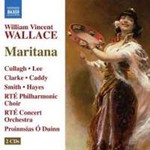
Maritana (Complete Opera recorded in 1995)
 $36.00
Out of Stock
$36.00
Out of Stock6+ weeks add to cart
WILLIAM WALLACE
Maritana (Complete Opera recorded in 1995)
Majella Cullagh / Lunda Lee / Paul Charles Clarke / Rte Philharmonic Choir / Rte Concert Orchestra / Proinnsias O Duinn
[ Naxos / 2 CD ]
Release Date: Tuesday 20 December 2011
This item is currently out of stock. It may take 6 or more weeks to obtain from when you place your order as this is a specialist product.
"[the cast] all sing with total dedication and conviction. It isn't at all difficult to understand Maritana's popularity, nor with the ensuing snobbery of the twentieth century, why it fell out of favour."
(Gramophone)
"[I] feel all the wiser for having at last been given the opportunity to hear a modern performance of this very important work, it's part of the missing link in our knowledge of British music theatre...[the cast] all sing with total dedication and conviction. It isn't at all difficult to understand Maritana's popularity, nor with the ensuing snobbery of the twentieth century, why it fell out of favour."
(Gramophone)
The most enduring operatic legacy from Victorian England remains the canon of comic masterpieces produced by William Gilbert and Arthur Sullivan during the last quarter of the 19th century. But, wrapped around this period, there was a now largely forgotten school of Romantic English opera whose lifespan stretched from the mid-1830s through to the outbreak of World War I. Ironically, the foremost composers in the early decades of this period were two Irishmen, Michael William Balfe and William Vincent Wallace.
Maritana, which had a triumphant première at London's Drury Lane Theatre on 15th November, 1845, was both the first stage work composed by Waterford-born Wallace and the greatest achievement of his career, although he went on to write five further operas before his early death in 1865. The libretto, a poor thing by any standards, was the work of Edward Fitzball (with some help from the equally inept Alfred Bunn, who contributed the lyrics for "Scenes that are brightest" and "In happy moments"). Based on D'Ennery and Dumanoir's play Don César de Bazan, it is nothing more than a hotch-potch of cardboard characters caught in improbable situations, noticeably the central device wherein the eponymous heroine, heavily veiled, is married to the about-to-be-executed Don Caesar. And if that sounds familiar, it is because W.S. Gilbert used the same scenario in The Yeomen of the Guard some 40 years later, causing Punch to sub-title that work The Merryman and his Maritana.
But the fictitious escapades of the intrepid Don and his winsome, if gullible, gypsy bride are as nothing compared to the real life happenings in the career of the peripatetic musician who set them to music. William Wallace (the Vincent was added when he converted to Catholicism in 1830) was born in Waterford on 11th March, 1812. His father, a Scottish-born regimental bandmaster, gave the young Wallace lessons in piano and clarinet and these were supplemented later by violin and organ studies. By the time he reached his late teens he was already an accomplished violinist and pianist in Dublin, where he played in the orchestra at the Theatre Royal. In 1830 he secured a post as church organist in Thurles where he met and married Isabella Kelly, with whom he settled in Dublin before emigrating to Australia in late 1835. Within five years, though, he deserted his family in Sydney and is said to have complemented his earnings from music with stints at, among other things, sheep farming and whale hunting before heading further afield. There are also tales of how he narrowly escaped being eaten by cannibals, was mauled by a tiger in India and caught in an earthquake in the South Seas. But these may well have been embellished by the imaginative Waterford man himself. What is not in dispute is the extent of his travels during those years, an odyssey which took him all the way from the Antipodes to South America.